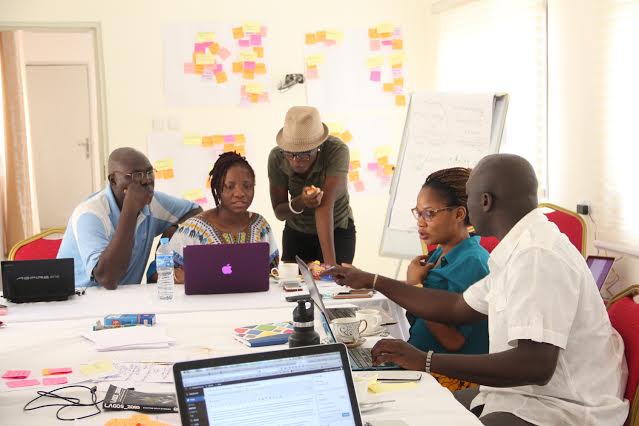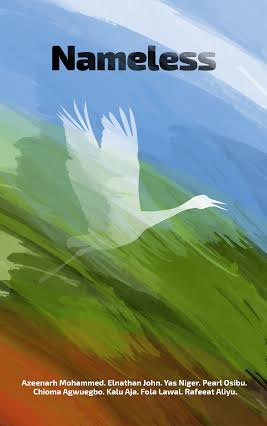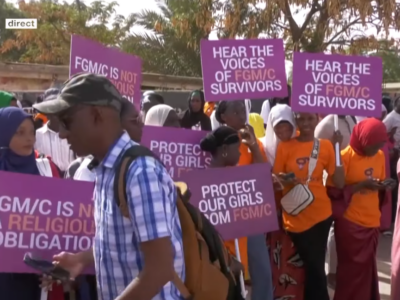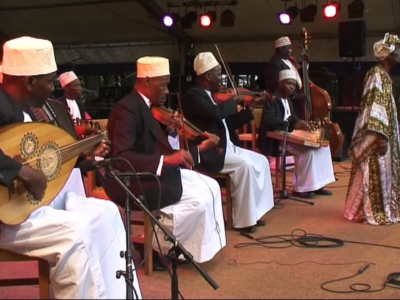
Escritores, blogueros y activistas nigerianos en acción. Imagen de Luis Antonio Delgado, utilizada con autorización.
Barbara Ruehling, cineasta y facilitadora del «Book Sprint», habló con nosotros acerca del «Book Sprint» de Nigeria que reunió a blogueros, escritores y activistas nigerianos para escribir un libro en cinco días.
Ndesanjo Macha (NM): Hola, Barbara, antes de pasar al tema del «Book Sprint», ¿podrías, por favor, hablarnos brevemente sobre ti?
Barbara Ruehling (BR): I'm Barbara Ruehling (@antropofilm), I'm a social anthropologist and filmmaker, and since 2013 I have been working as a facilitator for Book Sprints.
Barbara Ruehling (BR): Mi nombre es Barbara Ruehling (@antropofilm), soy antropóloga social y cineasta, y, desde 2013, trabajo como facilitadora de los «Book Sprints».
NM: ¿Qué es el «Book Sprint»?
BR: A Book Sprint is a method for rapid collaborative book production. It brings together a group of experts on a specific subject to write a book in no more than five days. Together they conceptualize, write, and produce a book without any written preparation. The group is led by a facilitator who uses a well-refined methodology to guide them through the process. The final product is high quality content, revised, edited, designed and ready to print immediately and as e-book formats.
BR: El «Book Sprint» es un método para producir un libro de forma colaborativa y rápida. Reúne un grupo de expertos en un tema específico para escribir un libro en no más de cinco días. Juntos, conceptualizan, escriben y producen un libro sin ninguna preparación escrita. El grupo es dirigido por un facilitador que utiliza una metodología bien definida para guiarlos a través de todo el proceso. El producto final posee un contenido de alta calidad, es revisado, editado y está diseñado y listo para ser impreso de forma inmediata además de lanzado en formato digital.
NM: ¿Cómo comenzaste a participar en esta iniciativa?
BR: I was trained to be a Book Sprint facilitator by Adam Hyde who developed the Book Sprints method six years ago. Initially, Adam was looking for a fun and rapid way to produce documentation for free and open software. He received so many requests that he could no longer facilitate all Book Sprints, so he trained me and later a few other facilitators. Since then we have tested and proven the method to work in many fields such as art history, science, and governance transparency, to name just a few. The genres range from software manuals to governance guidebooks to university textbooks and even fiction. We recently made our first fiction Book Sprint in Nigeria!
BR: Me capacité para ser facilitadora del método del «Book Sprint» con Adam Hyde, quién lo desarrolló hace seis años. En un principio, Adam buscaba una forma divertida y rápida de producir manuales para software libre y de código abierto. Recibió tantos pedidos que ya no pudo él mismo ser el facilitador de todos los «Book Sprints», por eso, me capacitó a mí y, luego, a algunos otros. Desde entonces, hemos puesto a prueba y comprobado que funciona en diferentes campos, tales como, historia del arte, ciencia y gobernanza transparente, solo por nombrar algunos. Los géneros van desde manuales para software hasta guías de gobernanza, desde libros de textos universitarios hasta inclusive libros de ficción. Recientemente, ¡hemos hecho nuestro primer «Book Sprint» en Nigeria!

Barbara Rühling, facilitadora de «Book Sprints». Imagen de Luis Antonio Delgado, utilizada con autorización.
NM: ¿Puedes contarnos cómo ocho blogueros, escritores y activistas sociales nigerianos se reunieron para escribir un libro durante cinco días? ¿Quiénes son estos escritores?
BR: The 8 participants in the Book Sprint in Nigeria were a group of fantastic people, bloggers, writers, satirists, political commentators, activists. They were invited by the Boell Stiftung in Nigeria that was looking for ways to mobilize young people in Nigeria to think and talk about the upcoming national elections in 2015. Nigeria has a growing reading culture, blogs and twitter are booming, and so a book seemed a good way to reach these people.
The writers are:
Rafeeat Aliyu (@cosmicyoruba) – Blogger, writer of fiction and non-fiction, history nerd.
Elnathan John (@elnathan) – A full-time writer.
Yas Niger (@YasNiger) – Blogger, writer.
Pearl Osibu (@Pearlosibu) – Blogger, writer, designer.
Chioma Agwuegbo (@ChiomaChuka) – Blogger, writer.
Kalu Aja (@kaluaja) – Financial planner and coach.
Azeenarh Mohammed (@xeenarh) – Noisemaker, privacy enthusiast, digital security trainer.
Fola Lawal (@SheCrownLita) – Publisher.
BR: Los ocho participantes del «Book Sprint» de Nigeria es un grupo de personas geniales, blogueros, escritores, comentaristas políticos, escritores satíricos y activistas. La fundación Böll Stiftung de Nigeria estaba buscando formas de movilizar a los jóvenes nigerianos para pensar y hablar acerca de las elecciones nacionales de 2015 y fue esta fundación quien invitó a los participantes al «Book Sprint». Nigeria posee una creciente cultura de la lectura, los blogs y Twitter están en auge, y un libro parecía ser una buena forma de llegar a esas personas.
Los escritores son:
Rafeeat Aliyu (@cosmicyoruba) – Bloguera, escritora de ficción y no ficción, fanática de la historia.
Elnathan John (@elnathan) – Escritor profesional.
Yas Niger (@YasNiger) – Bloguero, escritor.
Pearl Osibu (@Pearlosibu) – Bloguera, escritora, diseñadora.
Chioma Agwuegbo (@ChiomaChuka) – Bloguera, escritora.
Kalu Aja (@kaluaja) – Asesor financiero.
Azeenarh Mohammed (@xeenarh) – Alborotadora, fanática de la privacidad, instructora de seguridad digital.
Fola Lawal (@SheCrownLita) – Editora.

Tapa del libro escrito en 5 días en Nigeria. Arte de tapa de Henrik van Leeuwen. Imagen utilizada con autorización.
NM: ¿Cómo eligieron a los escritores?
BR: Azeenarh Mohammed (@xeenarh) hand picked the group for the Book Sprint, first of all because they are brilliant writers with interesting views, but also to represent a good balance of genders, religions, ages, and regions. I think she did a great job! As a facilitator I only consult the organizer how to choose participants, otherwise I stay neutral towards the content.
BR: Azeenarh Mohammed (@xeenarh) seleccionó personalmente el grupo para el «Book Sprint»; por un lado, porque son escritores excelentes con puntos de vista interesantes, por otro lado, para representar un buen equilibrio de géneros, religiones, edades y regiones. ¡Hizo un gran trabajo! Como facilitadora, solo consulto con el organizador acerca de cómo elegir a los participantes; me mantengo neutral respecto al contenido.
NM: ¿Por qué Nigeria?
BR: We have done Book Sprints all over the globe, and I'm really happy that there have been more and more Book Sprints outside of Western Europe and North America, in countries such as Colombia, Burundi, Ethiopia, and Nigeria. The Heinrich Boell Stiftung in Nigeria invited us to write and publish a book before the elections in 2015.
BR: Hemos hecho «Book Sprints» en todo el mundo y me pone muy contenta que haya cada vez más «Book Sprints» fuera de Europa Occidental y Norteamérica, en países como Colombia, Burundi, Etiopía y Nigeria. La fundación Heinrich Böll Stiftung de Nigeria nos invitó a escribir y publicar un libro antes de las elecciones de 2015.
NM: ¿Cuál es el tema central del libro?
BR: The book was born out of the need to provoke young Nigerians to think about their country ahead and beyond of the national elections. We started out with the working title «The Future We Want» and the idea to come up with a common vision within all the political, religious, and ethnic diversity of the country. The writers first wrote up a political critique juxtaposed with visions of alternative futures which they then turned into a series of provocative fictional stories. The stories center around a market town that could be any and everywhere in the country, and thus remains nameless. Nameless also became the title of the book.
BR: El libro nació de la necesidad de incitar a los jóvenes nigerianos a pensar acerca de su país frente a las elecciones nacionales y más allá de ellas. Comenzamos con el título «El futuro que queremos» y con la idea de proponer una visión común dentro de toda la diversidad política, religiosa y étnica del país. Los escritores, primero, hicieron una crítica política yuxtapuesta con visiones de futuros alternativos que, luego, convirtieron en una serie de provocadoras historias de ficción. Las historias se centran alrededor de un pequeño pueblo con un mercado, que podría ser cualquiera del país, y, por ese motivo, se mantuvo sin nombre. «Sin nombre» se convirtió también en el título del libro.
NM: ¿Podrías explicarnos cómo funciona la metodología de «Book Spint»?
BR: The methodology works through a high level of collaboration which is assisted by the facilitator, and a collaborative writing platform designed specifically for that purpose. By high level of collaboration we also mean that there are no individual authors in Book Sprints. Everyone is a writer, editor, and contributor in equal terms. That way we make sure that everyone's input is included, and in the end almost everyone has worked on almost every section of the book. This is a very intense process that builds high levels of motivation and trust within the group. It's the facilitators’ task to enable that kind of environment.
The topic is decided by a host organization before the Book Sprint, but everything beyond that is created by the group during those five days. The facilitator guides them through the process of finding a concept and a structure for the book, writing the different sections, revising, rewriting, and restructuring them. A remote team of an illustrator, a book producer, and a proofreader work simultaneously with the writers, so that when the writers are finished by the end of day 5, the illustrated, designed, and revised book is made available immediately.
BR: La metodología se basa en un alto nivel de colaboración asistido por el facilitador y en una plataforma de escritura colaborativa especialmente diseñada para ese propósito. Con un alto nivel de colaboración también nos referimos a que no hay autores individuales en un «Book Sprint». Cada uno es escritor, editor y colaborador por igual. De esta forma, nos aseguramos de que se incluya el aporte de cada uno, y, al final, casi todos trabajaron en casi todas las secciones del libro. Es un proceso muy intenso que genera altos niveles de motivación y confianza dentro del grupo. La tarea del facilitador es posibilitar que se produzca ese ambiente.
El tema lo decide la organización anfitriona antes del «Book Sprint», pero todo lo demás lo crea el grupo durante esos cinco días de trabajo. El facilitador los asesora en el proceso de encontrar un concepto y una estructura para el libro, de escribir las diferentes secciones y de revisarlas, reescribirlas y reestructurarlas. Un equipo remoto de un ilustrador, un productor de libros y un corrector trabajan de forma simultánea con los escritores, de manera que, cuando los escritores terminan su trabajo al final del quinto día, el libro ilustrado, diseñado y corregido esté disponible inmediatamente.
NM: ¿Qué rol tienen los medios sociales en el proyecto?
BR: Of course we love to tweet (@booksprint) and blog about our adventures, and we also increasingly upload voices of the participants to our vimeo channel. To write the book itself, however, it is invaluable to sit face to face in the same space.
BR: Por supuesto amamos tuitear (@booksprint) y bloguear acerca de nuestras aventuras, y, cada vez más, subimos las opiniones de los participantes a nuestro canal de Vimeo. Sin embargo, es invaluable el hecho de escribir el libro en sí, el sentarse cara a cara en el mismo espacio.
NM: Entiendo que hay un video que refleja la historia del libro, ¿es cierto?
BR: The story of the Book Sprint in Nigeria was so fascinating, we made a short documentary about it with visual artist Luis Antonio Delgado. You can watch it here. I've wanted to make a film that tells the story of Book Sprints for a while, and the one in Nigeria was ideal because it captured in content what the method itself is all about: bringing together diverse voices to create a common vision. With the elections at the doorstep it is also a very timely and important subject.
BR: La historia del «Book Sprint» de Nigeria fue tan fascinante que hicimos un documental breve con el artista visual Luis Antonio Delgado. Pueden verlo aquí. Hace tiempo que quería hacer una película que contara la historia de los «Book Sprints» y el de Nigeria fue ideal porque capta muy bien de lo se trata el método en sí mismo: de reunir voces diversas para crear un punto de vista común. Con las elecciones en puertas, es también un tema muy oportuno e importante.
NM: ¿El libro está disponible en línea?
BR: The book has a Creative Commons license and is available for free online, on the website of the Boell Foundation. The writers also uploaded it to smashwords and okadabooks.
BR: El libro tiene licencia de Creative Commons y está disponible en línea, gratis, en la página web de la fundación Böll. Los escritores también lo subieron a smashwords y okadabooks.
NM: ¿Cuál ha sido la reacción en los medios sociales?
BR: There was quite some buzz on Twitter, Nigerians are among the most active twitterers on my timeline for sure! One of the participants, Chioma Agwuegbo, blogged about her experiences each day at the Book Sprint.
All the others writers tweeted about it, for example Elnathan John after it was printed the day after the Book Sprint:
The book we wrote in 5 days is ready.
We titled it Nameless. And it is free! I'll let you know how you can get it.— Elnathan John (@elnathan) November
15, 2014When 2,000 print copies were distributed at the Ake Arts&Books Festival the following week, it was applauded by prominent writer Ayo Sogunro (@ayosogunro):
Finally! The book Nameless, by my folks: @xeenarh @elnathan @SheCrownLita @ChiomaChuka @Pearlosibu and others too. pic.twitter.com/x2CfNqqzDr
— Ayo Sogunro (@ayosogunro) November 20, 2014
Later, one of the participants, xeenarh (@xeenarh), even created an online survey about the book:
You've all read nameless? Pls fill out my 2 min survey :) @sagaysagay @ayosogunro @antropofilm @dirtytinker @aeesher https://t.co/mx1pgYcKLf
— xeenarh (@xeenarh) February 11, 2015
In a review of the book, blogger Folakemi Odoaje wrote:
What is incredible about Nameless is showing that all of Nigeria social, economic, religious and political issues are not
peculiar to a region or tribe – we all suffer the same fate therefore our collective efforts is imperative (…) I loved the mix of Nameless writers, everything about it. For those who believed our main problem lie in one region or the other, here the
writers are as diverse as Nigeria is, their biographies at the end of the book.
BR: Hubo mucho entusiasmo en Twitter; sin duda, ¡los nigerianos están entre los tuiteros más activos de mi Twitter! Una de las participantes, Chioma Agwuegbo, blogueó acerca de su experiencia cada día del Book Sprint.
El resto de los escritores tuitearon sobre su experiencia, por ejemplo, Elnathan John tuiteó luego de que el libro fuera impreso el día siguiente a que el «Book Sprint» finalizara:
The book we wrote in 5 days is ready.
We titled it Nameless. And it is free! I'll let you know how you can get it.— Elnathan John (@elnathan) November 15, 2014
El libro que escribimos en 5 días está listo. Lo titulamos «Sin Nombre». ¡Y es gratis! Ya les contaré cómo conseguirlo.
Cuando se distribuyeron 2000 copias impresas en el Ake Arts & Books Festival la semana siguiente, el libro fue celebrado por el destacado escritor Ayo Sogunro (@ayosogunro):
Finally! The book Nameless, by my folks: @xeenarh @elnathan @SheCrownLita @ChiomaChuka @Pearlosibu and others too. pic.twitter.com/x2CfNqqzDr
— Ayo Sogunro (@ayosogunro) November 20, 2014
¡Finalmente! El libro «Sin nombre» de mis amigos: @xeenarh @elnathan @SheCrownLita @ChiomaChuka @Pearlosibu y otros también».
Luego, otra de las participantes, xeenarh (@xeenarh), incluso creó una encuesta en línea acerca del libro:
You've all read nameless? Pls fill out my 2 min survey :) @sagaysagay @ayosogunro @antropofilm @dirtytinker @aeesher https://t.co/mx1pgYcKLf
— xeenarh (@xeenarh) February 11, 2015
¿Todos han leído «Sin Nombre»? Por favor, completen mi encuesta de dos minutos :) @sagaysagay @ayosogunro @antropofilm @dirtytinker @aeesher«.
En una reseña del libro, el bloguero Folakemi Odoaje escribió:
Lo que es increíble de «Sin Nombre» es que muestra que todas las cuestiones sociales, económicas, religiosas y políticas de Nigeria no son exclusivamente de una región o tribu – todos sufrimos el mismo destino, en consecuencia, es imperativo que hagamos un esfuerzo colectivo (…) Me gustó mucho la mezcla de escritores del libro, todo acerca de él. Para todos aquellos que creen que nuestro mayor problema reside en una región o en otra, aquí los escritores son tan diversos como toda Nigeria lo es, al final del libro encontrarán sus biografías.
NM: ¿Dónde será el próximo «Book Sprint»?
BR: The next one is with the Public Library of Science (PLOS) in California, and we have a couple of other Book Sprints already lined up for this year. I'm hoping for one in Asia, we haven't had any Book Sprint in that region yet!
BR: El próximo será junto a la Biblioteca Pública de Ciencia (PLOS, sigla en inglés de «Public Library of Science») de California, y ya tenemos otros «Book Sprints» organizados para este año. Deseo que haya uno en Asia, ¡porque no tuvimos ninguno en esa región aún!







1 comentario